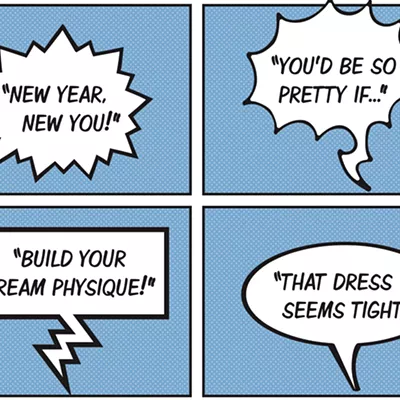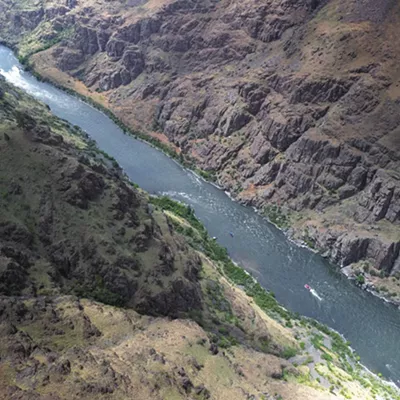The sign makes it clear; I am not allowed past this gate. But I trespass anyway. What irony — the name of this subdivision. Whitetail. This street: Migratory Way. One of the largest passages for elk and deer making their way from winter to summer feeding. There were camas fields here, too. Another seasonal migration.
This is a seasonal passage for me, too. I take this walk in the winter because all other routes are closed by deep, unplowed snow. And so I make my morning miles knowing I am pushing past boundaries set by an entity with the privilege and money to determine who passes here.
In winter, the coat, gloves and hat mask who I am. The cameras surely pick me up as I enter and leave, but so far, none of the golf-cart-driving rule enforcers have stopped me. The workers in white trucks wave as they pass me in my Yaktrax studded boots. They don't live here either. I keep the dogs on leashes, which I suppose makes my trespass less provoking. Even as my heart rebels, I am trying to look like I fit in here.
"I am trying to look like I fit in," my friend says into my ear as I walk. I have called him; these walks offer a chance to catch up with friends who live far from this mountain town. "I still feel like an outsider," he says.
We are talking about being Native in academia. Being writers. About spaces traditionally not open to people like us. He tells me the joy he felt when a Native student told him that seeing him teaching the class, rather than being taught about, gave him hope.
"I was never taught that I could give hope to anyone," he says. We were taught to look to others for hope. To aspire to be like those white teachers/writers/leaders placed in front of us.
Very few of these houses are occupied year-round, yet their drives are plowed, their heat is on. They sit like empty faces all in a row. Our house sits just outside the fence that surrounds this other neighborhood. It was built in haste, supposed to be a weekend cabin, not meant for full-time living. When I told a friend from my neighborhood that I was afraid of getting in trouble for walking in Whitetail, he said to tell them, "I'm your neighbor." He emphasized neighbor like it was the code word. I practice saying it, but I know that if I am confronted I will likely cower and leave.
"I feel like some people want me out," my friend says. I am halfway around the loop I'll make. "They look at me with those eyes..."
"I was a duck raised among geese, conditioned to believe I was one of them."
I know what he means. I have felt that look that says you don't belong here. Raised in a white home with white parents, I attended a white school, read white books and wrote white words. I live in a predominantly white town, work in a predominantly white job. I grew up in a world that saw me as white, yet I wasn't. I was a duck raised among geese, conditioned to believe I was one of them.
What others perceived on the outside didn't align with my internal reality. It took me years to realize that the discomfort I felt, both from within and from others, stemmed from their preconceived notions.
Eventually I was able to see myself as others did and, in doing so, allowed myself to grow into the fullness of that identity. I would never be one of them, but I would continue to insert myself into white spaces — to, like my friend, be that "someone who looks like me" for the person striving to see themselves in the places they want to be. Courage in place, but fear remains inevitable. Despite having my head up and smiling, I am sure that every Whitetail employee is the one who is coming to tell me to get out.
"I am afraid of being pushed out," my friend says. There are so many who patrol these traditionally white spaces enforcing rules made to protect their ideals, their sense of right. "It's so pervasive," my friend continues, "I often feel like I will convince myself I don't belong."
The last house on my walk is built in the colonial style. The windows curtained to a leer. I keep my dogs off the lawn worried that the slightest discoloration of their perfectly white snow will cause me to lose this privilege that should have been mine all along.
My friend says, "You are like a sister to me," and I say goodbye before I exit the gate back into my own neighborhood.
Months ago, sitting on the couch with my sister in the neighborhood where we grew up, I said, "I wonder why I was an orphan for 11 months and you were adopted three days after you were born?" My legal sister, she is freckled and light. Not blood relatives, but sisters. She looks at me for a long time, and I can see the answer behind her gateless eyes. "This wasn't a place for brown babies," she says, and I feel the curse of that land on my skin and let it seep in. When it reaches my heart, it becomes a dare. ♦
CMarie Fuhrman is the author of the collection of poems, Camped Beneath the Dam, and co-editor of two anthologies, Cascadia Field Guide and Native Voices: Indigenous Poetry, Craft, and Conversations. Fuhrman is the associate director of the graduate program in creative writing at Western Colorado University. She resides in West Central Idaho.

























